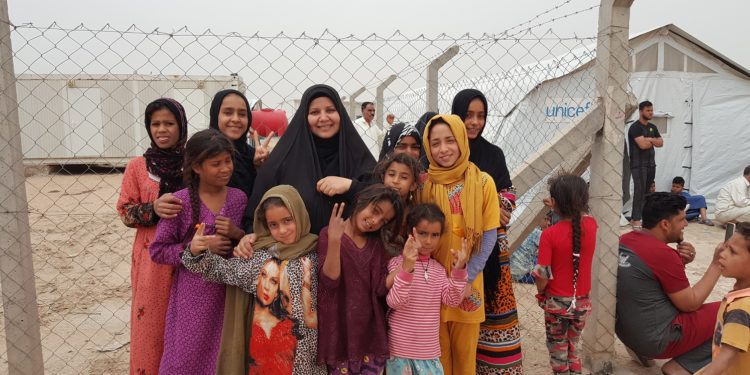I have worked a lot in the field of advocacy campaigns and humanitarian work, but I did not feel the fruit of all this until 2016 when a campaign was launched entitled “the Gypsy is human” and advocating for the rights of the gypsy.
Despite my awareness of the danger of going into this area, I live in a conservative community environment that rejects the gypsies and does not accept them, but I took the initiative to launch my campaign with the support and of my husband Ahmad al-Shaibani and the blessing of my humanitarian family and parents.
I launhced the campaign and published it on a face book page that I manage called “Tea and Bread”. The first rights I demanded was the the right of gypsies to education. Children in this village were deprived of education for more than 14 years after the fall of the regime after the unknown gunmen who demolished their village.
The campaign targeted especially the children of Qarya al-Zihoor “Village of Flowers” of Diwaniyah Province (180 KM) in south Iraq. Many bloggers and social media activists from the capital city encouraged me with this campaign, this was despite the existence of the oppositional trend who completely criticized me and challenged my moral values for doing so.
At that time, I faced many difficulties but also received many tips and advices from friends who asked me to abondon the case and preserve my reputation and life. But I was determined and had an increasing resolve when a team of defenders, advocates, and activists joined me. Together we formed a team and called it “I am human” and we worked together and focused on education of children.
We set up two tents that we got from the former Director of Education of Diwaniya Aqeel al-Jubouri and began to rehabilitate children psychologically, socially and educationally. Then a number of teachers joined our team who come from the districts and areas of Diwaniyah.
The campaign continued for one year and six months and we received many donations for children like clothes, food, stationary, carpets and two tends and heating tools. The campaign was accompanied by a campaign for environmental and health awareness, a campaign to clean the village, as well as humanitarian assistance from the International Committee of the Red Cross (ICRC), as well as financial grants to five gypsy women who set up their own special projects.
The Red Cross was the first international organization to respond to our appeal through its office in Najaf. Then a staff member of the High Commission for Human Rights, Mr. Uday Ibrahim, contacted me and asked for detailed information about the campaign. He then addressed the Human Rights Office at the Ministry of Education several times.
After a series of moves by international support organizations, UNICEF set up a primary school in the village of Zihoor, where gypsies live and where children learn and we chose the name of “Palm” rather than the name of the former school which was “reform”. After that, a team of teachers and teachers volunteered to open literacy centers and teach illiterate adults to read and write and became official centers with the blessing of the Ministry of Education. A religious cleric named Abdullah Khatib volunteered to give loans for young people to set up their own projects and pay back the load later in installments.
In this experience I was able to break a small part of society’s restrictions and their bullying towards the gypsy and gained the sympathy of some of them, some of whom publicly declared their sympathy while others expressed their sympathy secretly because they feared society. Later, another campaign entitled “Where is My Identity” was launched to demand the right of gypsies to the national card. Some of these gypsies faced many problems because they did not have such a card.
The religious leaders and clerics this time advocated this issue in such a way that I can not ever forget. Including the director of the office of Mr. Moqtada al-Sadr who held Friday prayers in the same village of Zihoor and addressed the central and local governments and the House of Representatives the need to give the gypsies the rights and most important national card as well as Mr. Ali Talqani, who also visited the village. We are grateful for the government that supported our campaign.
All in all, the dream of the gypsies to get the national card was fulfilled and they got rid of the nightmare, which was written in the form of the words in their old identity cards and we continue to campaign even though the team are busy, but I always find new teams of real advocates and defenders who support me.

